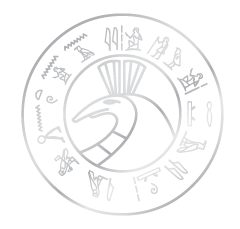
Concerning InEssay 6
The custom of In is a Temple-wide custom that originates within the Order of Setne Khamuast, and that we pride ourselves on Understanding and cultivating. Many of us utter the words “In Sutk” after we light the Black Flame, the Symbol of Set's only Gift to us.
The Egyptian economy was neither a capitalist nor a communist economy. It had a system of redistribution based on trade, tribute, tax and a "divine" part of the economy—gift-giving. The word for gift is In, plural Inw, as in In sutk, "The Gift of Set." (If you're looking in Budge, you find it spelled An, pg. 56.) In could either mean gifts from foreigners to the Pharaoh, gifts from the Pharaoh to his nobles, gifts to/from the gods, or gifts from the nobles to the people.
Wealth and magical/religious power was circulated by gift-giving. Things which were given became Holy, full of power. Just as the Pharaoh existed on both the divine and human realms—gifts existed on divine and human realms as well. A "Gift" is as precise a "sending" as are Words—but it also as precise a "sending" as a substance.
Gifts fall into both the categories of Greater Black Magic, which is almost always Word- or Symbol driven, and Medial Black Magic, which is often substance driven. Learning to Give or to Receive a Gift is Holy Selfishness, and is part of that little-discussed area of Xeper, the exchange. Some gifts are given very personally, such as a Medallion from one Setian to another, others are given impersonally such as the Gift of communicable methods of initiation that Orders give to the Temple as a whole.
The concept of In has two aspects in the current Temple of Set—one illustrative, the other operant. The illustrative component is found in the idea of the Black Flame, Set's only gift to us.
There are many meditations for the Setian in the idea of the Black Flame. Why should such thing be given? What (if any) is the obligation in receiving the gift?
Magus Flowers wrote one of the best essays on Set and his Gift for
distribution at the Salem Conclave some years ago. If you have not seen it
before, I would like you to look it over and discuss it with your fellow
Setians:
I. Set is the Principle of Isolate Intelligence.
II. It is dynamic (evolving).
III. Its purpose is self-maintenance, expansion, and perpetuation. This
is its only good—otherwise it is beyond good and evil.
IV. It is not omnipotent—it must work for the changes it causes.
V. It is not omniscient—it must work to see objectively.
VI. Its Gift of Self is perfect (complete).
VII. It can inform or "teach" those possessed of its quality.
VIII. To give more (if possible) would be to take.
IX. The presence of the Gift in us (flesh) is necessary to the evolution
of the Principle of Isolate Intelligence.
The operative aspect of In is gift-giving between Setians. At the Dallas Conclave the custom of In was begun. Priestess Webb and I gathered a few cheap copies of several reading list books and set them out for interested Setians to take home. This was an interesting meditation. When you give a Gift, it is indeed gone. Sometimes, things were picked and then dropped in the hotel lobby. Other books were the launching pad for various articles we've seen in the Scroll of Set, or of rituals we have heard about.
Now this sort of Gift giving is not appropriate for international gatherings where Customs officers might not be too understanding, but this sort of passing on—whether it's candle holders to Reading List books—is a formula that you may wish to experiment with. You will learn more about the Gift if you enact its dynamics.
If you are interested in In and its aspects both in the Egyptian economy and in Egyptian politics and religion, you should read The Official Gift in Ancient Egypt by Edward Bleiberg, University of Oklahoma Press 1996.
